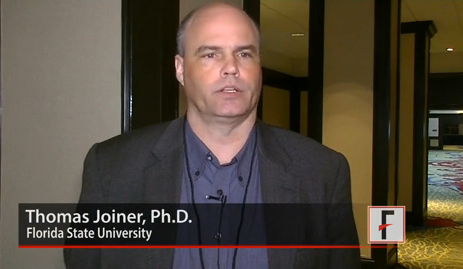User login
CHICAGO – Because not everyone has immediate access to treatment for suicidal depression, Thomas Joiner, Ph.D., codirector of the Military Suicide Research Consortium in Tallahassee, Fla., is helping develop virtual adjunct psychotherapies to help de-escalate acute suicide until first-line therapy can be administered.
"We are trying to locate really simple but effective interventions for suicide in service members – but we think it’s going to be generalizable beyond the military – take those risk factors from a level that is worrisome and in some cases catastrophic and make them more manageable so that other treatments have a chance to take hold and to do their work," Dr. Joiner said in an interview after his presentation given at the scientific session of the annual conference of the Anxiety and Depression Association of America.
The technology for these interventions is basic and "available to most people," according to Dr. Joiner, and includes at least one smartphone app that reminds people experiencing suicidal ideation that they matter to others and that their death would adversely affect people they love.
The video associated with this article is no longer available on this site. Please view all of our videos on the MDedge YouTube channel
On Twitter @whitneymcknight
CHICAGO – Because not everyone has immediate access to treatment for suicidal depression, Thomas Joiner, Ph.D., codirector of the Military Suicide Research Consortium in Tallahassee, Fla., is helping develop virtual adjunct psychotherapies to help de-escalate acute suicide until first-line therapy can be administered.
"We are trying to locate really simple but effective interventions for suicide in service members – but we think it’s going to be generalizable beyond the military – take those risk factors from a level that is worrisome and in some cases catastrophic and make them more manageable so that other treatments have a chance to take hold and to do their work," Dr. Joiner said in an interview after his presentation given at the scientific session of the annual conference of the Anxiety and Depression Association of America.
The technology for these interventions is basic and "available to most people," according to Dr. Joiner, and includes at least one smartphone app that reminds people experiencing suicidal ideation that they matter to others and that their death would adversely affect people they love.
The video associated with this article is no longer available on this site. Please view all of our videos on the MDedge YouTube channel
On Twitter @whitneymcknight
CHICAGO – Because not everyone has immediate access to treatment for suicidal depression, Thomas Joiner, Ph.D., codirector of the Military Suicide Research Consortium in Tallahassee, Fla., is helping develop virtual adjunct psychotherapies to help de-escalate acute suicide until first-line therapy can be administered.
"We are trying to locate really simple but effective interventions for suicide in service members – but we think it’s going to be generalizable beyond the military – take those risk factors from a level that is worrisome and in some cases catastrophic and make them more manageable so that other treatments have a chance to take hold and to do their work," Dr. Joiner said in an interview after his presentation given at the scientific session of the annual conference of the Anxiety and Depression Association of America.
The technology for these interventions is basic and "available to most people," according to Dr. Joiner, and includes at least one smartphone app that reminds people experiencing suicidal ideation that they matter to others and that their death would adversely affect people they love.
The video associated with this article is no longer available on this site. Please view all of our videos on the MDedge YouTube channel
On Twitter @whitneymcknight
EXPERT ANALYSIS FROM THE ADAA ANNUAL CONFERENCE
